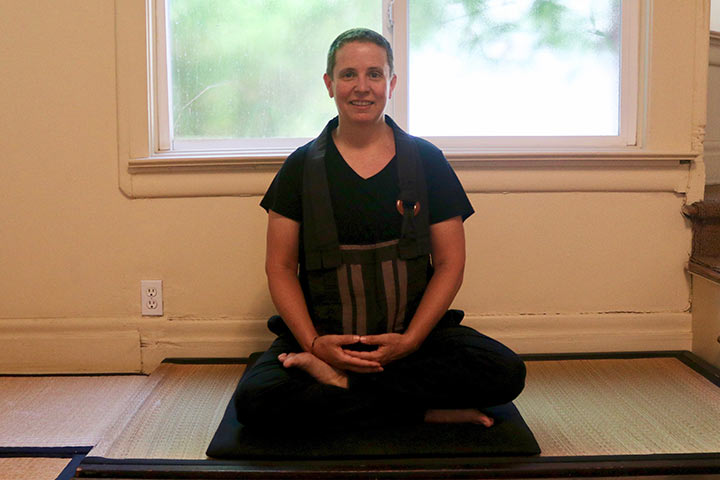
White Aspiring Allies
October 1, 2020
by Jitsujo Gauthier
Soon after the May 25th killing of George Floyd, fellow ZCLA resident Harlan Jindo Pace and I began the Anti-Racism Reading Group (ARRG) at ZCLA via Zoom. This group is still forming and processing its identity. There is discomfort in many of us around creating a white-only group; at the same time we need the space to deconstruct whiteness, and practice talking about our privilege and part in racial history. I think it is hard for us white folks to see that our reality is in fact segregated by design with some exceptions, so we chose a group name that felt racially neutral.
The ARRG group began by reading the Racial Healing Handbook: Practical Activities to Help You Challenge Privilege, Confront Systemic Racism, and Engage in Collective Healing by Anneliese Singh. We developed group safety and accountability agreements and we share about exercises from the book at weekly meetings. In July, we began using a dialogue practice called the R.A.C.E. Method, which I learned from an “Empathy is Your Superpower” course I took with Dr. David Campt. The R.A.C.E. Method is a way to call us into conversations that explore beliefs and direct experiences of racism and race, as opposed to calling each other out on racist thoughts, statements, and actions. Here is the basic method:
REFLECT: To prepare for a difficult conversation, take a breath, get centered, and relax.
ASK: From a place of not-knowing, without trying to change the person in front of you or their beliefs, be brave and ask questions that help you become clear about what they believe to be true. Once you are clear, ask if they have had any direct experience(s) that led to their beliefs.
CONNECT: Tell a story that shows that you understand where this person is coming from and aligns with at least one aspect of their point of view, e.g., “I see, I also felt like this.”
EXPAND: After telling your connect story, pause, and then add a story that expands how our beliefs and/or direct experience may be problematic, linked to a larger system of racism, bias, stereotypes, or unseen privileges, which divide rather than unite us.
Dr. Campt’s philosophy is about developing empathy and creating environments for allyship. Our group spent weeks on the Ask step, learning to disclose and ask questions about racially problematic beliefs and experiences. The Ask step seems to be the most difficult. It’s easier to go straight to an Expand story and say what you know to be true, but this breaks the connection. Part of white fragility is an inability to lean into a difficult conversation around race, emotionally tolerate something racially problematic, and stay in the conversation with a humble and compassionate heart. There is humility in seeking to understand, remaining curious, and asking someone to expound on a belief system or direct experience entirely different from one’s own. Black Indigenous People of Color (BIPOC) have been engaging in these types of conversations with humility for many years.
We need the space to deconstruct whiteness, and practice talking about our privilege and part in racial history.
After the 2016 election, Dr. Campt realized that conversations about race in our country needed to happen between white people, rather than between BIPOC and white people. I see that calling ourselves an Anti-racist group may not adequately represent what we are currently doing. Perhaps we are more like a group of white people reading about racism, trying to see and disclose our blindness of racism and supremacy. Although, I think we aspire to be a group that helps shoulder the burden of the racial justice work that BIPOC have been doing for so long. Perhaps we can be a space for white folks to ask basic questions around topics of race, microaggressions, structures of whiteness, and privilege.
In truth we are like babies learning to crawl. Do you know that stage before the baby is able to crawl where they rock back and forth on their hands and knees hoping that the momentum will somehow thrust them forward?
A baby may spend day after day trying to thrust one knee forward in hopes the arm will simultaneously follow, repeating this action simply to crawl. Surrounding adults may try to help by modeling the crawl, physically moving a leg or arm, cheering, patiently watching from a distance, and intervening when things seem unsafe. Can we embrace our vulnerability, be more playful about learning, and receive help when it’s offered with a sense of appreciation and grace?
In truth we are like babies learning to crawl.
Our group is open to those with white-skinned privilege that would like to learn how to crawl through dialogues around race and racism. If you are a sangha member further along this path of anti-racist allyship and would like to hold space, articulate blind spots, or share your learning along the way—we welcome your help. We don’t know what we don’t know. What keeps us stuck is isolation and not taking responsibility for our own ignorance. The world we are being asked to reimagine is of course right here. This is a world where we see our differences clearly and play freely in the fields of the pure land with ease and grace. Do you see this?
Rev. Jitsujo is a resident ZCLA priest and a Dharma Holder.
